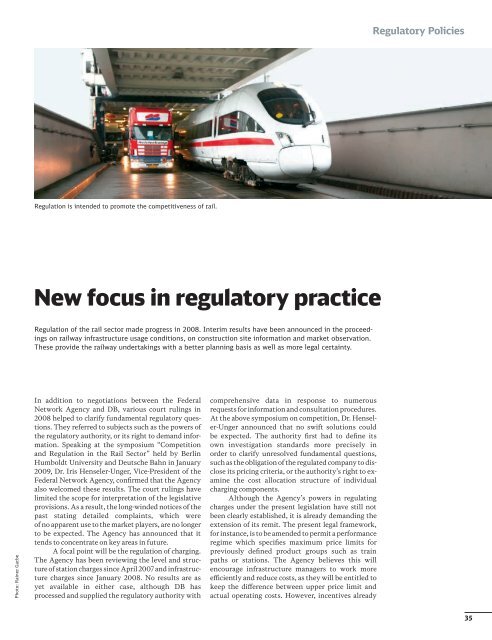Competition Report 2009
Competition Report 2009
Competition Report 2009
Create successful ePaper yourself
Turn your PDF publications into a flip-book with our unique Google optimized e-Paper software.
Photo: Rainer Garbe<br />
Regulation is intended to promote the competitiveness of rail.<br />
New focus in regulatory practice<br />
Regulation of the rail sector made progress in 2008. Interim results have been announced in the proceedings<br />
on railway infrastructure usage conditions, on construction site information and market observation.<br />
These provide the railway undertakings with a better planning basis as well as more legal certainty.<br />
In addition to negotiations between the Federal<br />
Network Agency and DB, various court rulings in<br />
2008 helped to clarify fundamental regulatory questions.<br />
They referred to subjects such as the powers of<br />
the regulatory authority, or its right to demand information.<br />
Speaking at the symposium “<strong>Competition</strong><br />
and Regulation in the Rail Sector” held by Berlin<br />
Humboldt University and Deutsche Bahn in January<br />
<strong>2009</strong>, Dr. Iris Henseler-Unger, Vice-President of the<br />
Federal Network Agency, confirmed that the Agency<br />
also welcomed these results. The court rulings have<br />
limited the scope for interpretation of the legislative<br />
provisions. As a result, the long-winded notices of the<br />
past stating detailed complaints, which were<br />
of no apparent use to the market players, are no longer<br />
to be expected. The Agency has announced that it<br />
tends to concentrate on key areas in future.<br />
A focal point will be the regulation of charging.<br />
The Agency has been reviewing the level and structure<br />
of station charges since April 2007 and infrastructure<br />
charges since January 2008. No results are as<br />
yet available in either case, although DB has<br />
processed and supplied the regulatory authority with<br />
comprehensive data in response to numerous<br />
requests for information and consultation procedures.<br />
At the above symposium on competition, Dr. Henseler-Unger<br />
announced that no swift solutions could<br />
be expected. The authority first had to define its<br />
own investigation standards more precisely in<br />
order to clarify unresolved fundamental questions,<br />
such as the obligation of the regulated company to disclose<br />
its pricing criteria, or the authority’s right to examine<br />
the cost allocation structure of individual<br />
charging components.<br />
Although the Agency’s powers in regulating<br />
charges under the present legislation have still not<br />
been clearly established, it is already demanding the<br />
extension of its remit. The present legal framework,<br />
for instance, is to be amended to permit a performance<br />
regime which specifies maximum price limits for<br />
previously defined product groups such as train<br />
paths or stations. The Agency believes this will<br />
encourage infrastructure managers to work more<br />
efficiently and reduce costs, as they will be entitled to<br />
keep the difference between upper price limit and<br />
actual operating costs. However, incentives already<br />
Regulatory Policies<br />
35


